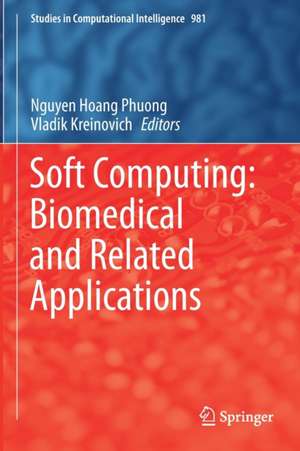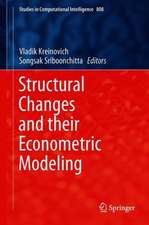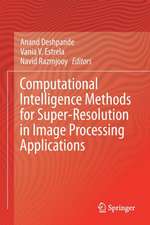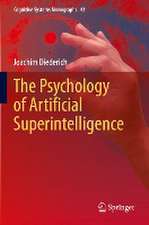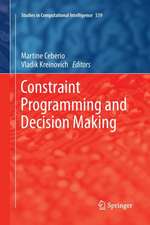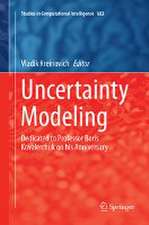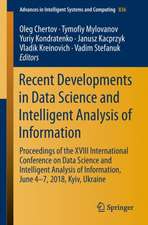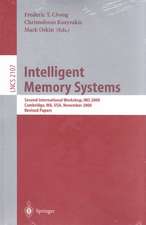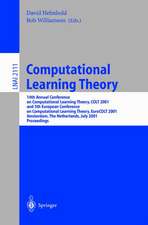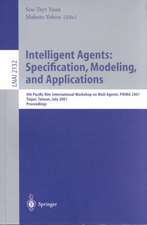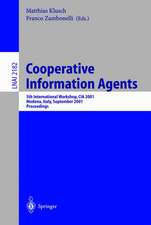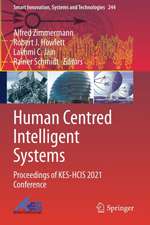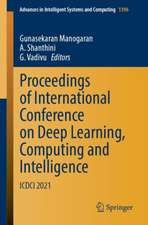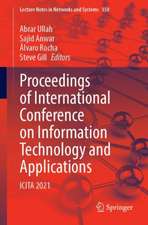Soft Computing: Biomedical and Related Applications: Studies in Computational Intelligence, cartea 981
Editat de Nguyen Hoang Phuong, Vladik Kreinovichen Limba Engleză Paperback – 18 iun 2022
This book helps practitioners and researchers to learn more about computational intelligence methods and their biomedical applications—and to further develop this important research direction.
| Toate formatele și edițiile | Preț | Express |
|---|---|---|
| Paperback (1) | 647.45 lei 6-8 săpt. | |
| Springer International Publishing – 18 iun 2022 | 647.45 lei 6-8 săpt. | |
| Hardback (1) | 653.71 lei 6-8 săpt. | |
| Springer International Publishing – 17 iun 2021 | 653.71 lei 6-8 săpt. |
Din seria Studies in Computational Intelligence
- 20%
 Preț: 449.37 lei
Preț: 449.37 lei - 20%
 Preț: 1158.26 lei
Preț: 1158.26 lei - 20%
 Preț: 986.66 lei
Preț: 986.66 lei - 20%
 Preț: 1452.76 lei
Preț: 1452.76 lei - 20%
 Preț: 168.78 lei
Preț: 168.78 lei - 20%
 Preț: 1291.10 lei
Preț: 1291.10 lei - 18%
 Preț: 1112.30 lei
Preț: 1112.30 lei - 20%
 Preț: 565.39 lei
Preț: 565.39 lei - 20%
 Preț: 649.28 lei
Preț: 649.28 lei - 20%
 Preț: 1047.73 lei
Preț: 1047.73 lei - 20%
 Preț: 1578.96 lei
Preț: 1578.96 lei - 20%
 Preț: 643.50 lei
Preț: 643.50 lei - 20%
 Preț: 657.49 lei
Preț: 657.49 lei - 20%
 Preț: 993.28 lei
Preț: 993.28 lei - 20%
 Preț: 990.80 lei
Preț: 990.80 lei - 20%
 Preț: 989.96 lei
Preț: 989.96 lei - 20%
 Preț: 1165.69 lei
Preț: 1165.69 lei - 20%
 Preț: 1444.52 lei
Preț: 1444.52 lei - 20%
 Preț: 1041.96 lei
Preț: 1041.96 lei - 20%
 Preț: 1047.73 lei
Preț: 1047.73 lei - 20%
 Preț: 1046.06 lei
Preț: 1046.06 lei - 18%
 Preț: 2500.50 lei
Preț: 2500.50 lei - 20%
 Preț: 989.13 lei
Preț: 989.13 lei - 20%
 Preț: 1165.69 lei
Preț: 1165.69 lei - 20%
 Preț: 1164.05 lei
Preț: 1164.05 lei - 20%
 Preț: 1042.79 lei
Preț: 1042.79 lei - 20%
 Preț: 1460.19 lei
Preț: 1460.19 lei - 18%
 Preț: 1403.52 lei
Preț: 1403.52 lei - 18%
 Preț: 1124.92 lei
Preț: 1124.92 lei - 20%
 Preț: 1039.47 lei
Preț: 1039.47 lei - 20%
 Preț: 1008.11 lei
Preț: 1008.11 lei - 20%
 Preț: 1045.25 lei
Preț: 1045.25 lei - 20%
 Preț: 1275.42 lei
Preț: 1275.42 lei - 20%
 Preț: 1040.32 lei
Preț: 1040.32 lei - 20%
 Preț: 988.32 lei
Preț: 988.32 lei - 20%
 Preț: 1169.79 lei
Preț: 1169.79 lei - 20%
 Preț: 1162.37 lei
Preț: 1162.37 lei - 20%
 Preț: 1059.26 lei
Preț: 1059.26 lei - 20%
 Preț: 1164.05 lei
Preț: 1164.05 lei - 20%
 Preț: 1166.52 lei
Preț: 1166.52 lei - 20%
 Preț: 1459.38 lei
Preț: 1459.38 lei - 18%
 Preț: 1005.74 lei
Preț: 1005.74 lei - 20%
 Preț: 997.38 lei
Preț: 997.38 lei - 20%
 Preț: 1055.94 lei
Preț: 1055.94 lei - 20%
 Preț: 1284.47 lei
Preț: 1284.47 lei - 20%
 Preț: 994.08 lei
Preț: 994.08 lei - 20%
 Preț: 1048.72 lei
Preț: 1048.72 lei - 20%
 Preț: 1066.02 lei
Preț: 1066.02 lei - 20%
 Preț: 943.78 lei
Preț: 943.78 lei - 20%
 Preț: 1173.10 lei
Preț: 1173.10 lei
Preț: 647.45 lei
Preț vechi: 809.32 lei
-20% Nou
Puncte Express: 971
Preț estimativ în valută:
123.93€ • 134.66$ • 104.17£
123.93€ • 134.66$ • 104.17£
Carte tipărită la comandă
Livrare economică 21 aprilie-05 mai
Preluare comenzi: 021 569.72.76
Specificații
ISBN-13: 9783030766221
ISBN-10: 3030766225
Ilustrații: IX, 325 p. 139 illus., 96 illus. in color.
Dimensiuni: 155 x 235 mm
Greutate: 0.47 kg
Ediția:1st ed. 2021
Editura: Springer International Publishing
Colecția Springer
Seria Studies in Computational Intelligence
Locul publicării:Cham, Switzerland
ISBN-10: 3030766225
Ilustrații: IX, 325 p. 139 illus., 96 illus. in color.
Dimensiuni: 155 x 235 mm
Greutate: 0.47 kg
Ediția:1st ed. 2021
Editura: Springer International Publishing
Colecția Springer
Seria Studies in Computational Intelligence
Locul publicării:Cham, Switzerland
Cuprins
Part I: Biomedical Applications of Computational Intelligence Techniques.- Bilattice CADIAG-II: Theory and Experimental Results.- A Combination Model of Robust Principal Component Analysis and Multiple Kernel Learning for Cancer Patient Stratification.- Attention U-Net with Active Contour based Hybrid Loss for Brain Tumor Segmentation.- Refining Skip Connections by Fusing Multi-scaled Context in Neural Network for Cardiac MR Image Segmentation.- End-to-end Hand Rehabilitation System with Single-shot Gesture Classification for Stroke Patients.- Feature Selection based on Shapley Additive Explanations on Metagenomic Data for Colorectal Cancer Diagnosis.- Clinical Decision Support Systems for Pneumonia Diagnosis using Gradient-weighted Class Activation Mapping and Convolutional Neural Networks.- Improving 3D Hand Pose Estimation with Synthetic RGB Image Enhancement using RetinexNet and Dehazing.- Imbalance in Learning Chest X-ray Images for COVID-19 Detection.- Deep Learning based COVID-19 Diagnosis by Joint Classification and Segmentation.- Part II: General Computational Intelligence Techniques and Their Applications.- Why It Is Sufficient to Have Real-Valued Amplitudes in Quantum Computing.
Textul de pe ultima copertă
This book lists current and potential biomedical uses of computational intelligence methods. These methods are used in diagnostics and treatment of such diseases as cancer, cardiac diseases, pneumonia, stroke, and COVID-19. Many biomedical problems are difficult; so, often, the current methods are not sufficient, new methods need to be developed. To confidently apply the new methods to critical life-and-death medical situations, it is important to first test these methods on less critical applications. The book describes several such promising new methods that have been tested on problems from agriculture, computer networks, economics and business, pavement engineering, politics, quantum computing, robotics, etc.
This book helps practitioners and researchers to learn more about computational intelligence methods and their biomedical applications—and to further develop this important research direction.
This book helps practitioners and researchers to learn more about computational intelligence methods and their biomedical applications—and to further develop this important research direction.
Caracteristici
Provides recent research on Soft Computing for Biomedical Applications and Related Topics Presents applications and technical aspects of soft computing for biomedical problems Aims at practitioners and researchers helping them to learn more about the soft computing techniques
